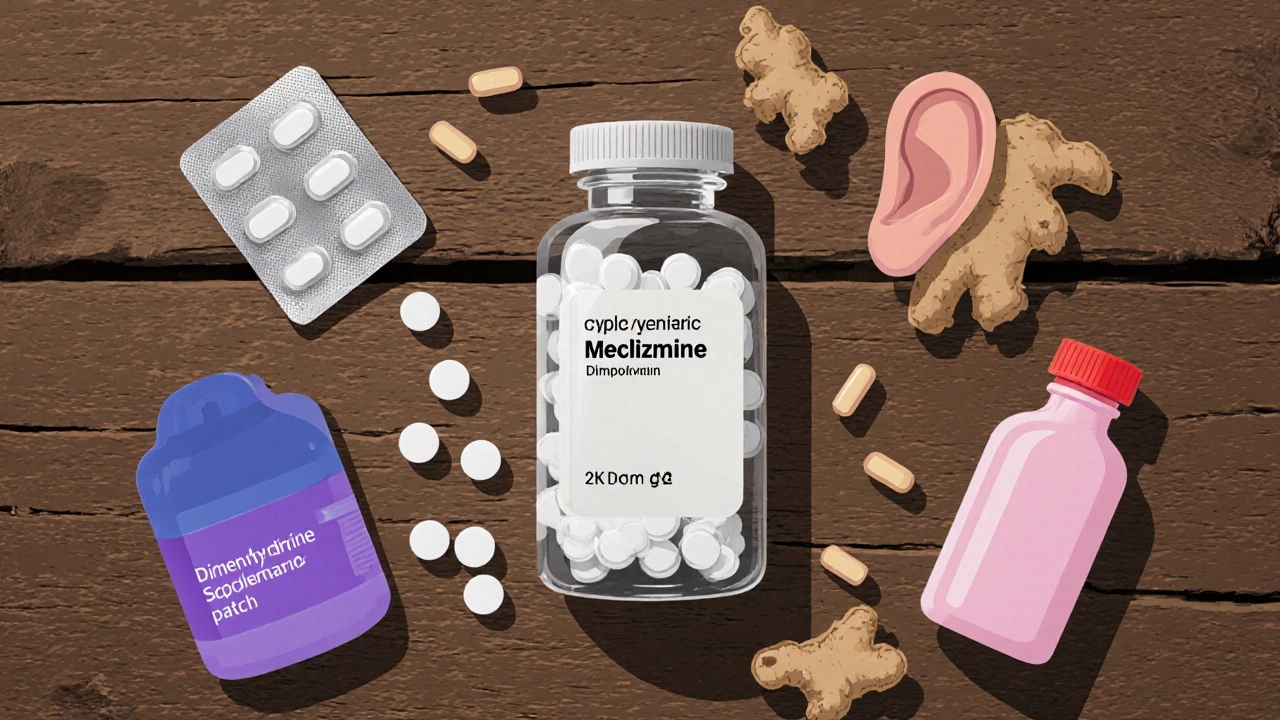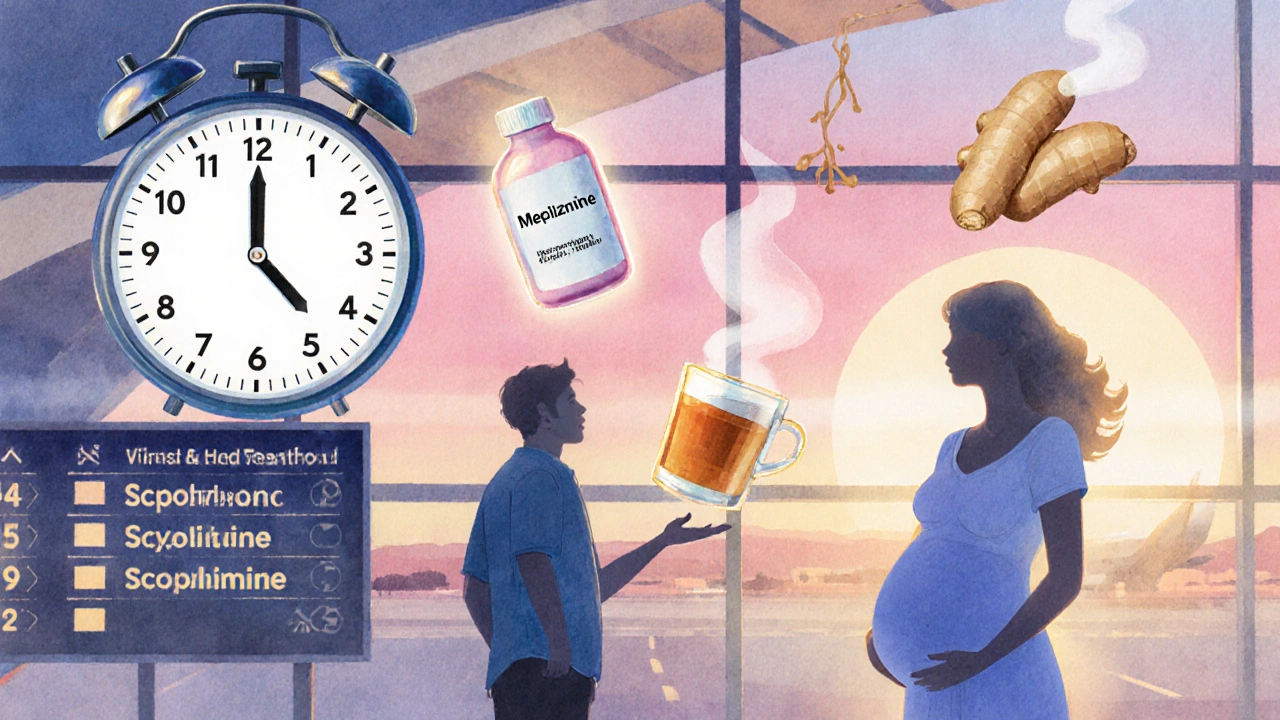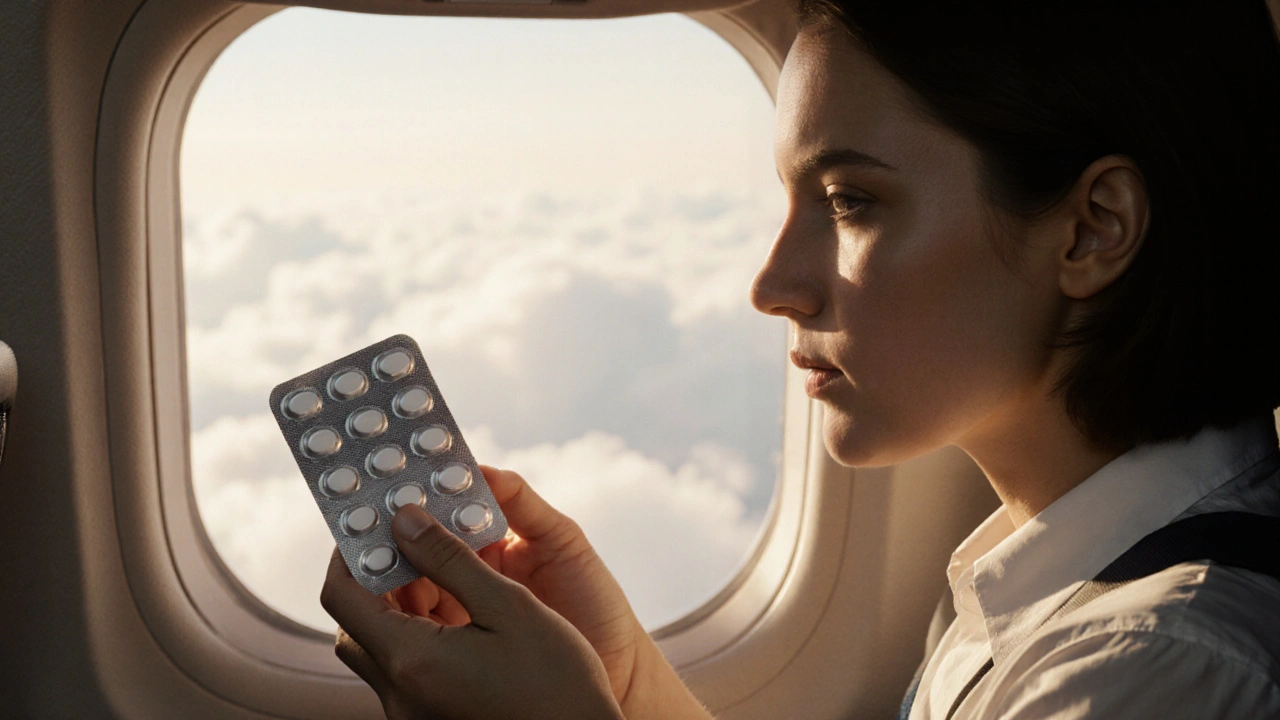When a bout of motion sickness or vertigo hits, most people reach for the same over‑the‑counter pill without really knowing if it’s the best fit. Meclizine is a first‑generation antihistamine that many label as the go‑to solution, but there are several other options that might work better for certain situations. This guide breaks down Meclizine, compares it with the most common alternatives, and helps you decide which anti nausea medication aligns with your needs.
What Is Meclizine? - Quick Facts
Meclizine is a synthetic piperazine‑derived antihistamine approved by the FDA for motion sickness and peripheral vertigo. It blocks H1 histamine receptors in the brain’s vestibular nuclei, reducing the mismatch between visual cues and inner‑ear signals that triggers nausea.
- Typical adult dose: 25‑50mg taken 1hour before travel or as a single daily dose for vertigo.
- Onset: 1hour (peak effect at 2‑3hours).
- Duration: 24hours, allowing once‑daily dosing.
- Common side effects: Drowsiness, dry mouth, blurred vision.
- Pregnancy category: B (generally considered safe, but discuss with a provider).
Because it stays active for a full day, Meclizine is popular for long trips, cruise vacations, and patients with chronic vertigo. However, its sedating properties can be a drawback for drivers or people who need to stay alert.
Key Alternatives to Consider
Below are the most widely used competitors, each belonging to a slightly different drug class or delivery format.
- Dimenhydrinate - an over‑the‑counter antihistamine often marketed as Dramamine.
- Scopolamine - a plant‑derived anticholinergic available as a transdermal patch.
- Cyclizine - another piperazine antihistamine similar to Meclizine but with a slightly different side‑effect profile.
- Promethazine - a phenothiazine antihistamine that also has anti‑emetic properties.
- Ginger - a natural root often taken as capsules or tea, backed by several clinical trials for mild motion sickness.
Comparison Table: Meclizine vs. Its Main Rivals
| Medication | Drug Class | Typical Dose | Onset | Duration | Common Side Effects | Pregnancy Category | Approx. Cost (30‑day supply) |
|---|---|---|---|---|---|---|---|
| Meclizine | First‑gen antihistamine | 25‑50mg PO daily | ~1hour | 24hours | Drowsiness, dry mouth | B | $0.80 (generic) |
| Dimenhydrinate | \nFirst‑gen antihistamine | 50‑100mg PO every 4‑6h | 30‑60min | 4‑6hours | Strong drowsiness, stomach upset | C | $1.20 (OTC pack) |
| Scopolamine Patch | Anticholinergic | 1patch (1.5mg) behind ear every 72h | ~1hour | 72hours (steady release) | Dry mouth, blurred vision, confusion (elderly) | C | $15‑$20 |
| Cyclizine | Piperazine antihistamine | 50mg PO daily or 25mg q6h PRN | ~30min | 12‑24hours | Mild drowsiness, anticholinergic effects | B | $2.00 (generic) |
| Promethazine | Phenothiazine antihistamine | 12.5‑25mg PO q6‑8h | 15‑30min | 4‑6hours | Strong drowsiness, extrapyramidal symptoms (rare) | C | $0.90 (generic) |
| Ginger (capsules) | Natural root extract | 250‑500mg PO q6h | ~45min | 4‑6hours | Heartburn, mild diarrhea | A | $5‑$9 (30‑day supply) |

How to Choose the Right Option for Your Situation
Not every anti‑nausea drug fits every traveler. Below are common scenarios and the medication that typically shines.
- Long‑haul flights or cruises (24‑hour coverage needed): Meclizine’s once‑daily dosing and 24‑hour duration make it the least disruptive choice.
- Short trips with frequent dosing (e.g., day trips, road trips): Dimenhydrinate or Promethazine work well because you can repeat every 4‑6hours.
- Elderly patients or those on multiple meds: Scopolamine patches avoid oral dosing but require caution for dry mouth and confusion; Cyclizine’s milder sedation is another option.
- Pregnant travelers: Meclizine (CategoryB) is generally preferred over Dimenhydrinate (CategoryC) and Scopolamine (CategoryC). Always get medical clearance.
- People who want a non‑drug approach: Ginger offers modest relief with a very safe profile, making it attractive for mild motion sickness.
When cost is a factor, generic Meclizine and generic Cyclizine are the cheapest, while Scopolamine patches are the priciest but provide a hands‑free solution.
Safety Tips & Common Pitfalls
- Avoid alcohol while taking any antihistamine - it amplifies drowsiness.
- Don’t combine two sedating antihistamines (e.g., Meclizine + Dimenhydrinate) unless a doctor advises it.
- Check for drug‑interaction warnings if you’re on antidepressants, anticholinergics, or seizure meds.
- Elderly users should start with the lowest dose and monitor for confusion or urinary retention.
- If you experience severe dry mouth, stay hydrated and consider sugar‑free gum.
Always read the label for contraindications such as glaucoma, enlarged prostate, or known hypersensitivity.

Quick Decision Checklist
- Do I need 24‑hour coverage? → Meclizine or Cyclizine
- Am I traveling short distances and can dose frequently? → Dimenhydrinate or Promethazine
- Do I prefer a patch over pills? → Scopolamine
- Is pregnancy a concern? → Meclizine (CategoryB) or ginger
- Is cost the primary driver? → Generic Meclizine or Cyclizine (< $2 for a month)
Frequently Asked Questions
Can I take Meclizine with alcohol?
No. Alcohol enhances the sedative effect of Meclizine and can impair coordination, making it unsafe to drive or operate machinery.
How does a Scopolamine patch compare to Meclizine for sea travel?
The patch delivers a steady dose for up to 72hours, so you don’t need to remember pills. It’s less sedating than Meclizine but can cause dry mouth and blurred vision, especially in older adults.
Is ginger as effective as prescription meds?
Clinical studies show ginger reduces mild to moderate nausea by about 30‑40%. It’s not as powerful as Meclizine for severe vertigo, but it’s a safe, drug‑free option for occasional motion sickness.
What should I do if Meclizine makes me too sleepy?
Try a lower dose (25mg) or take it at bedtime instead of before travel. If sedation remains an issue, switch to Cyclizine, which tends to cause less drowsiness for many users.
Can I give Dimenhydrinate to a child?
Dimenhydrinate is approved for children 2years and older, but the dose is weight‑based (25mg for 24‑35lb, 50mg for larger children). Always consult a pediatrician before giving any medication.
Bottom Line
If you need reliable, once‑daily protection for a long journey, Meclizine remains the most convenient and affordable choice. For short trips, frequent dosing, or when you want a non‑sedating option, Dimenhydrinate, Cyclizine, or a Scopolamine patch might suit you better. Pregnant travelers and those who favor natural remedies can safely turn to ginger, though the relief is milder. Use the checklist above, consider side‑effect tolerances, and always talk to a healthcare provider if you’re unsure.



20 Comments
Erin Smith October 12, 2025 AT 05:45
Meclizine is a solid pick for long trips!
George Kent October 12, 2025 AT 15:28
If you’re looking for something that actually works, grab the generic meclizine-skip the pricey patches!!! 😤😡
Albert Gesierich October 13, 2025 AT 00:55
Meclizine’s 24‑hour coverage really shines on intercontinental flights. The 25 mg dose taken an hour before takeoff provides steady antihistamine activity without the need for re‑dosing. Compared to dimenhydrinate, it avoids the frequent dosing schedule that can be a nuisance on road trips. Just remember to avoid alcohol, because the combination amplifies sedation. If drowsiness becomes an issue, a lower 25 mg dose or switching to cyclizine is a reasonable tweak.
Suraj Midya October 13, 2025 AT 10:55
meclizine aint bad but it can make u feel super sleepy. if u need to drive, try cyclizine its less drowsy. scopolamine patch is cool for long cruises but watch ur mouth dry. ginger is a natural alternative but it wont stop severe vertigo. always check with ur doc before mixing meds.
ashish ghone October 13, 2025 AT 21:28
Hey folks, I get how confusing the options can be when you’re planning a trip. Think of Meclizine as the reliable workhorse-it’s cheap, once‑daily, and covers a full day of motion. When you need flexibility for shorter hops, Dimenhydrinate gives you that 4‑hour repeat window, though the drowsiness can pile up. For sea voyages where you can’t keep popping pills, the Scopolamine patch releases a steady dose for up to three days, but keep a spare bottle of water handy for the dry mouth. If you’re pregnant or just prefer a plant‑based route, ginger capsules have modest evidence and almost no side‑effects. Always pair any medication with non‑pharma steps like looking at the horizon and staying hydrated. And remember, never combine two sedating antihistamines unless a doctor says it’s safe 😊
steph carr October 14, 2025 AT 07:11
Traveling soon? Meclizine can be your backstage pass to a smooth journey, especially when you’ve got a full day of sightseeing ahead. If you’re on a budget, the generic version costs less than a cup of coffee and still gives you that solid 24‑hour shield. For quick fixes on a road trip, keep a bottle of Dimenhydrinate in the glove box-you’ll appreciate the fast kick. Expect a little dry mouth? Chewing sugar‑free gum works wonders. Stay safe, stay curious, and enjoy the adventure!
Vera Barnwell October 14, 2025 AT 18:18
There’s a hidden agenda behind the glittering pharmacy shelves, and it starts with the way they market those sleek Scopolamine patches as the ultimate miracle for sea sickness. The truth, however, is that the same corporations flood the market with cheap Meclizine, keeping the profit margins low while the public remains blissfully unaware of the subtle side‑effects that gnaw at your night‑time rest. You might think the drowsiness is just a harmless lull, but over the long haul it can erode your alertness, making you vulnerable to accidents that could have been avoided. Meanwhile, the ginger capsules sit quietly on the aisle, praised by fringe blogs that whisper about “natural defenses” while big pharma scoffs and pushes their synthetic pills. It’s not a coincidence that the FDA’s “Category B” label for Meclizine feels comforting, yet the fine print warns of “possible sedation.” Every dose of Dimenhydrinate carries a hidden cost-a spike in stomach upset that can ruin your food plans during a hike. The cyclizine alternative, though less talked about, is quietly effective and sidesteps the intense drowsiness, but it never gets the flashy ads, so it stays in the shadows. Imagine a world where travelers are truly informed, where the choice between a patch and a pill is based on transparent data rather than slick packaging. The table in the article does a decent job of laying out onset and duration, but it hides the nuanced interactions with other common meds like antidepressants, which can amplify sedation dramatically. If you’re sipping tea on a boat, the dry mouth from a patch could become a choking hazard, especially if you forget to sip water regularly. And let’s not ignore the subtle psychological impact-knowing you’re on a “prescription” can make you more prone to notice every tremor, turning mild motion into a full‑blown nausea episode. The conspiratorial whisper goes further: some insurance plans deliberately under‑cover the cost of natural remedies like ginger to keep patients locked into more expensive pharmaceutical cycles. In contrast, the $0.80 generic Meclizine may look like a bargain, but the hidden societal cost of reduced productivity due to lingering grogginess is rarely accounted for. So, when you stand at the pharmacy counter, ask yourself: am I choosing because of genuine efficacy, or because the marketing machine has nudged me toward the easiest, most advertised option? The answer lies in balancing the clinical facts with personal tolerance, and perhaps daring to experiment with a blend of ginger tea and a low‑dose antihistamine for a smoother ride. In the end, knowledge is the strongest antidote to the hidden currents that sway our decisions, and a well‑read guide like this one can illuminate the path between the stormy seas of side‑effects and the calm harbor of informed choice.
David Ross October 15, 2025 AT 03:11
Meclizine offers a reliable, once‑daily solution for those long hauls-no need to pop a pill every few hours!!! Its low cost makes it unbeatable for budget travelers!!!
Henry Seaton October 15, 2025 AT 11:48
Meclizine works for a day it can make you sleepy take it at night if you need to stay alert later
Baby Thingie October 15, 2025 AT 20:08
Meclizine’s pharmacokinetics provide a 24‑hour window, suitable for extended travel. Consider cyclizine if sedation is undesirable. :)
Abby Elizabeth October 16, 2025 AT 04:45
Ugh, the whole meclizine vs ginger debate feels like a soap opera; one moment you’re hyped about cheap pills, the next you’re drowning in dry mouth drama. Seriously, it’s exhausting that we keep pushing the same old meds when the world offers better alternatives.
Mark Haycox October 16, 2025 AT 13:05
The British market overprices scopolamine patches while American pharmacies keep meclizine cheap. It’s a clear example of how foreign pricing policies exploit travelers.
Michael Taylor October 16, 2025 AT 23:05
When you’re boarding a 12‑hour flight, the idea of taking a pill every four hours can feel like an endless chore, especially when you have to coordinate timing with meals and bathroom breaks. Meclizine, with its 24‑hour coverage, eliminates that hassle, allowing you to set it once and forget it, which is a massive convenience factor for any long‑haul traveler. The trade‑off, of course, is the drowsiness that can linger into the first few hours after landing, potentially interfering with post‑flight plans such as meetings or sightseeing. Some users mitigate this by taking the dose at night, essentially turning the sedative effect into a sleep aid, but that strategy requires careful planning to avoid jet lag. Compared to dimenhydrinate, which peaks quickly but fades fast, meclizine offers a steadier, more predictable pharmacological profile, making it the go‑to choice for many seasoned flyers. However, if you’re particularly sensitive to anticholinergic side effects, exploring cyclizine or a scopolamine patch might provide a more tailored solution. In short, the decision hinges on balancing convenience against the desired level of alertness post‑dose.
Troy Brandt October 17, 2025 AT 08:31
Alright, let’s break this down step by step so you can walk away feeling confident about your anti‑nausea plan. First, identify the duration of your travel: if you’re on a cruise that spans multiple days, a medication that lasts 24‑hours or longer, like meclizine or a scopolamine patch, will save you from constant dosing. Second, consider your tolerance for sedation; if you need to stay sharp for navigation or work, cyclizine or a low dose of meclizine taken at night can keep you alert while still providing relief. Third, don’t overlook non‑pharmacological aids-looking at the horizon, staying hydrated, and keeping a light snack can significantly reduce the severity of motion‑induced nausea. Fourth, always review potential drug interactions-if you’re on antidepressants or seizure meds, consult your doctor before adding any antihistamine. Lastly, keep a small emergency kit with a backup option; if one medication doesn’t cut it, having dimenhydrinate on hand can be a lifesaver. By following this roadmap, you’ll be equipped to handle whatever motion challenges come your way, and you’ll do it with a clear head and steady stomach.
Barbra Wittman October 17, 2025 AT 16:51
Oh, thank you for that exhaustive lecture on meclizine’s “convenience”-it’s not like we needed a five‑minute TED talk to understand that a pill exists. Your breakdown of “sedation vs. convenience” reads like a bedtime story for retirees who enjoy counting sheep after a long flight. While you’re busy championing the “once‑daily miracle,” you completely ignore the fact that many people actually enjoy staying awake and alert for post‑flight adventures. Perhaps you’ve never experienced the frustration of a cloudy brain trying to navigate an airport after a dose that hits you like a freight train at 2 a.m. I guess the only thing you’re really selling is the illusion that one pill can replace common sense and proper hydration. So, kudos for the poetic prose, but maybe next time keep the drama to a minimum and focus on pragmatic advice.
Gena Thornton October 18, 2025 AT 01:45
While the sarcasm is noted, the underlying point about balancing efficacy and side‑effects remains valid. Users should weigh the trade‑offs and perhaps try a lower meclizine dose before resorting to stronger alternatives. Practical guidance, not dramatics, is what the community benefits from.
Lynnett Winget October 18, 2025 AT 11:28
Picture this: a sun‑kissed deck, waves rocking gently, and a ginger capsule quietly humming its anti‑nausea magic while you sip a cool lemonade. It’s the poetic alternative that dances between nature and science, offering a subtle, non‑sedating lift that’s perfect for light‑hearted wanderers.
Amy Hamilton October 18, 2025 AT 20:55
In the grand tapestry of travel, the choice of anti‑nausea medication is a micro‑cosm of humanity’s broader quest for equilibrium between control and surrender. Meclizine grants control through its predictable pharmacokinetics, yet it demands surrender to its sedative whispers. The philosopher in me appreciates the dialectic: one must accept the trade‑off between uninterrupted motion and the serenity of a rested mind. Thus, informed decision‑making becomes an act of self‑actualization, aligning bodily chemistry with the voyage’s rhythm.
Jordan Schwartz October 19, 2025 AT 06:05
When evaluating options, a quick pros‑and‑cons list can clarify which medication aligns with your specific travel scenario. Write down duration, need for alertness, and any medical constraints, then match them to the table’s data. This straightforward approach often leads to a confident choice.
Nitin Chauhan October 19, 2025 AT 15:31
Meclizine cheap and effective for long trips but watch dry mouth stay hydrated